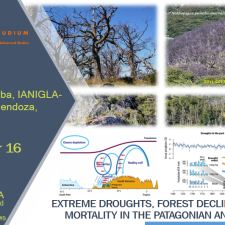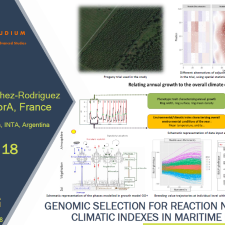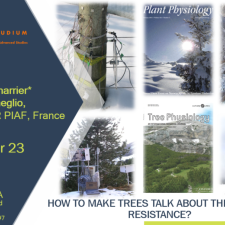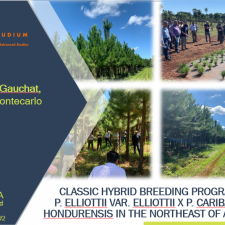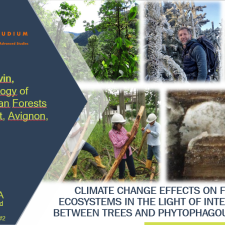Notice
#6 INTEGRATING QUANTITATIVE GENETICS AND GENOMICS WITH FOCUS ON IMPROVING PRODUCTIVITY AND CLIMATE-ADAPTABILITY TRAITS IN TWO BOREAL CONIFER BREEDING PROGRAMS - Eduardo Pablo Cappa
- document 1 document 2 document 3
- niveau 1 niveau 2 niveau 3
Descriptif
Round of FORESTIA web seminars 2022
SEMINAR # 6
"INTEGRATING QUANTITATIVE GENETICS AND GENOMICS WITH FOCUS ON IMPROVING PRODUCTIVITY AND CLIMATE-ADAPTABILITY TRAITS IN TWO BOREAL CONIFER BREEDING PROGRAMS"
Dr. Eduardo Pablo Cappa, INTA, Argentina
August 26 at 15h (CET/Paris time)
The International Associated Laboratory FORESTIA starts in 2022 a new round of short seminars aimed at stimulating the scientific comunication among its members, as well as between them and other international laboratories.
These seminars are a new opportunity for the FORESTIA scientists to present and discuss their objectives, research work and results on adaptation of forest ecosystems to global changes.
Seminar #6 by Dr. Eduardo Pablo Cappa, INTA, Argentina
Abstract
There is an urgent need in forest tree species to accelerate the breeding cycle and to change the seed orchard production profiles from solely one of improved growth, to that of improved climate resiliency. Genomic prediction and genome-wide association analyses are currently being seen as powerful tools to facilitate the rapid selection of superior genotypes and to identify alleles or genomic regions of complex traits in forest tree species. In this presentation, I will focus on different quantitative genetic and genomic tools and how to fully integrate genomic data linked to productivity- and climate change-related (adaptive) traits in two conifer tree-breeding programs: Pinus contorta Dougl. (interior lodgepole pine) and Picea glauca (Moench) Voss (white spruce), managed by the forest industry and Government of Alberta (Canada), respectively. The results of these studies, presented in three recent scientific publications, illustrate the advantages of using genomic information jointly with productivity and climate-adaptability traits, to enhance the identification and selection of genetic material of these two boreal conifer tree species for the production of resilient and sustainable forests in a changing climate context.
>> Next seminar on September 23th by Thierry Ameglio, INRAE, France
Thème
Dans la même collection
-
#9 Extreme droughts, forest decline and mortality in the Patagonian Andes
SEMINAR # 9 : "Extreme droughts, forest decline and mortality in the Patagonian Andes" Ricardo Villalba (IANIGLA-CONICET, Mendoza, Argentina)
-
#8 : "Genomic selection for reaction norms on climatic indexes in maritime pine"
SanchezLeopoldoSEMINAR # 8 : "Genomic selection for reaction norms on climatic indexes in maritime pine" Léopoldo Sanchez-Rodriguez (INRAE, BioForA, France)
-
#7 « How to make trees talk about their frost resistance? »
CharrierGuillaumeAméglioThierrySEMINAR # 7 : « How to make trees talk about their frost resistance? » Guillaume Charrier (Speaker) and Thierry Ameglio, INRAE, UMR PIAF, France
-
#5-Climate Change effect on forests : A plant hydraulic perspective of issues and solutions
Martin-St PaulNicolasThe International Associated Laboratory FORESTIA starts in 2022 a new round of short seminars aimed at stimulating the scientific comunication among its members, as well as between them and other
-
#2 CLASSIC HYBRID BREEDING PROGRAM FOR P. ELLIOTTII VAR. ELLIOTTII X P. CARIBAEA VAR. HONDURENSIS I…
Gauchat Funes DrewesMaría ElenaRound of FORESTIA web seminars SEMINAR # 2 "Classic Hybrid Breeding Program for P. elliottii var. elliottii x P. caribaea var. hondurensis in the Northeast of Argentina" María Elena Gauchat,
-
#3 CLIMATE CHANGE EFFECTS ON FOREST ECOSYSTEMS IN THE LIGHT OF INTERACTIONS BETWEEN TREES AND PHYTO…
BoivinThomasRound of FORESTIA web seminars SEMINAR # 3 "Climate change effects on forest ecosystems in the light of interactions between trees and phytophagous insects" Thomas Boivin, INRAE, France May 13
-
#1 "How climate change is challenging forest research" - Pr. Philippe Rozenberg
RozenbergPhilippeLia forestia 2022 Webinaire 1 du 25 mars 2022 par Philippe Rozenberg (INRAE, France) "How climate change is challenging forest research"


